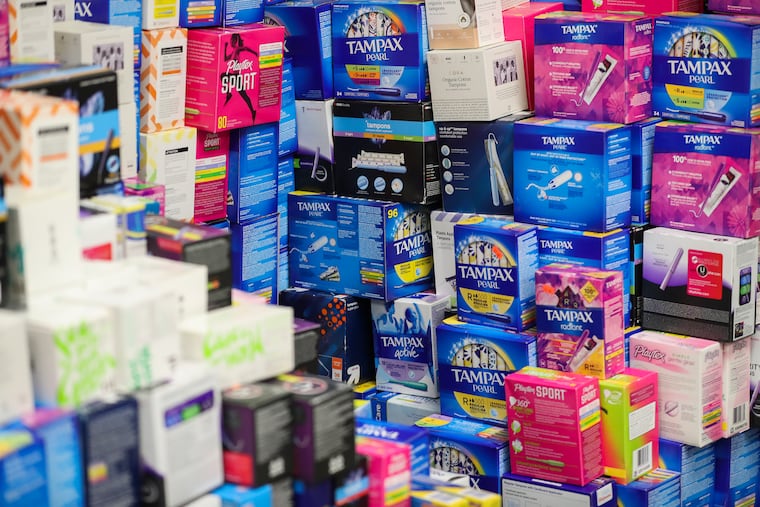Pa. could give out free period products in schools
A proposal that passed the state House with bipartisan support this week would create a public school grant program and set aside $3 million to provide schools with menstrual products.

HARRISBURG — Pennsylvania could provide free menstrual products to public school students under a new proposal that aims to reduce the number of girls who have to miss out on school due to their period.
One in four women or girls has skipped school, work or job interviews because they were unable to afford the proper menstrual products, according to national estimates. In some instances, people will use unhealthy alternatives — such as socks, paper towels, or T-shirts — that can cause health issues.
The proposal, which passed the Democrat-led state House with bipartisan support this week, would create a public school grant program and set aside $3 million to provide schools with menstrual products. It’s unlikely to be passed by the GOP-controlled state Senate, but could be passed as part of state budget negotiations.
The bill is sponsored by State Rep. Darisha Parker (D., Philadelphia). It’s the second menstrual product-related bill she has championed this legislative session; a bill to allow the state to request a federal waiver so low-income people can use SNAP or WIC to purchase diapers or menstrual products passed the House last year.
Parker wants to raise awareness of the issue, also known as period poverty, in the state Capitol building. Almost every day has a different period-related name — Menstruation Monday, Tampon Tuesday, to name a few — and she will carry around a box of tampons (which, she adds, cost her $12 for a single box).
Parker said her tenacity helped get bipartisan passage of her bill — a feat that required educating a chamber dominated by men, many of whom were completely unaware of the issue before her effort.
Gov. Josh Shapiro, a Democrat, has also gotten involved in the fight to make period products more equitable. In his state budget proposal, he asked for $3 million for the Department of Education to distribute free period products at all public schools.
“Tears came to my eyes when Gov. Shapiro in February said it once or twice, ‘period.’ And setting aside the amount of $3 million,” Parker said, adding that she’s since become close with first lady Lori Shapiro, who has spoken publicly about the issue.
But even as understanding of the problem grows in Harrisburg, the proposals for funding are unlikely to pass the Republican-led state Senate. Earlier this year, Senate President Pro Tempore Kim Ward (R., Westmoreland) called Shapiro’s pitch “a much more liberal budget, even to the point where they are putting sanitary napkins in schools.”
State Sen. Michelle Brooks (R., Crawford) chairs the Senate Health committee. She has not considered the legislation that would allow people to use SNAP or WIC for menstrual products or diapers in the year since it was assigned to her committee, and Parker’s latest bill will likely be assigned to her committee, as well. A spokesperson for Brooks said the senator does not comment on potential legislation and declined to comment.
Lynette Medley, who founded No More Secrets in 2012 to provide women with menstrual products and has since created the first menstrual hygiene hub in the nation in Germantown, said period poverty affects marginalized communities at higher rates than studies suggest.
“When you look at people in poverty, people who are food insecure, 50% of that population is in period poverty,” Medley said. “We don’t talk about periods. How can I talk about an uncomfortable thing when you don’t even talk about it with your friends. How am I going to say I have a deficit in menstrual hygiene?”
While the bill passed with bipartisan support, by a 117-85 vote, some Republican women still objected.
On the House floor before the vote Tuesday, State Rep. Stephanie Borowicz said the bill was “just another step by the governor and Democrats to have government provide everything for you, which leads to communism.”
Medley said the reason a person could experience period poverty are wide-ranging, including bleeding disorders or lengthy menstrual cycles. And there’s a misunderstanding among people who come “from a perspective of privilege,” she said.//
”That’s not what exists in most of our school districts,” Medley added. “Have you ever been to a Philadelphia school? They don’t barely have the money for basic things.”
Parker, however, said she’d take a word out of former first lady Michelle Obama’s playbook: “When they go low, we go high.”
”I’m going to keep going,” Parker added. “I’m not gonna give her energy for any of her antics. There’s no reason for me to.”